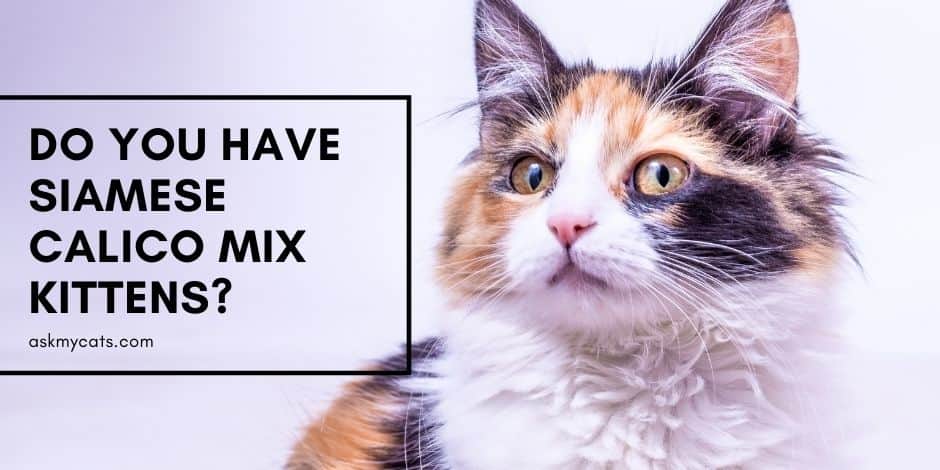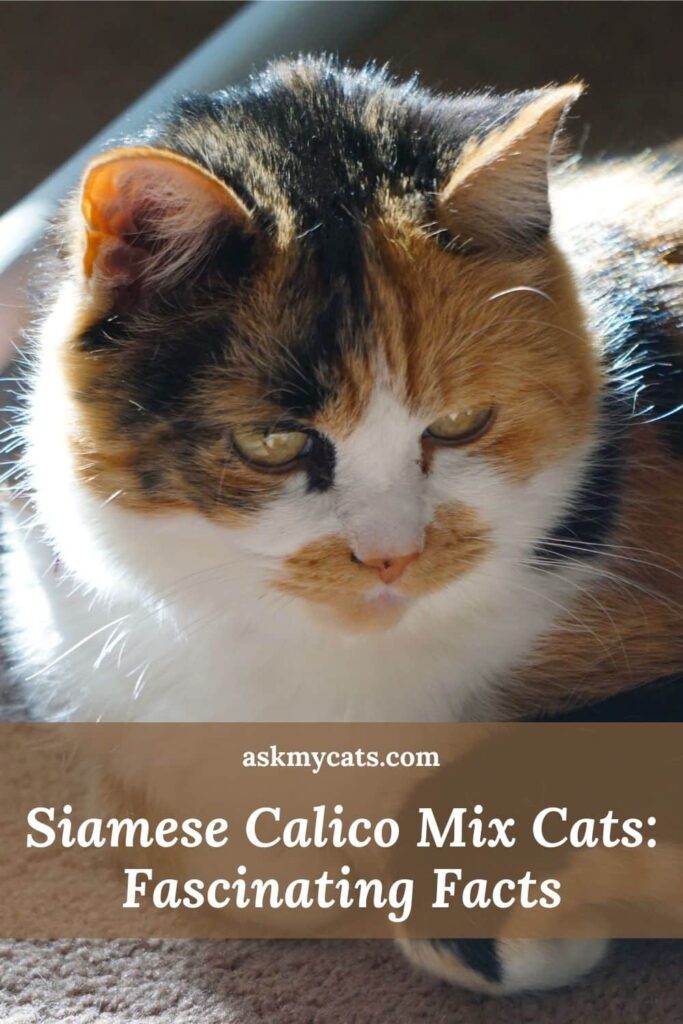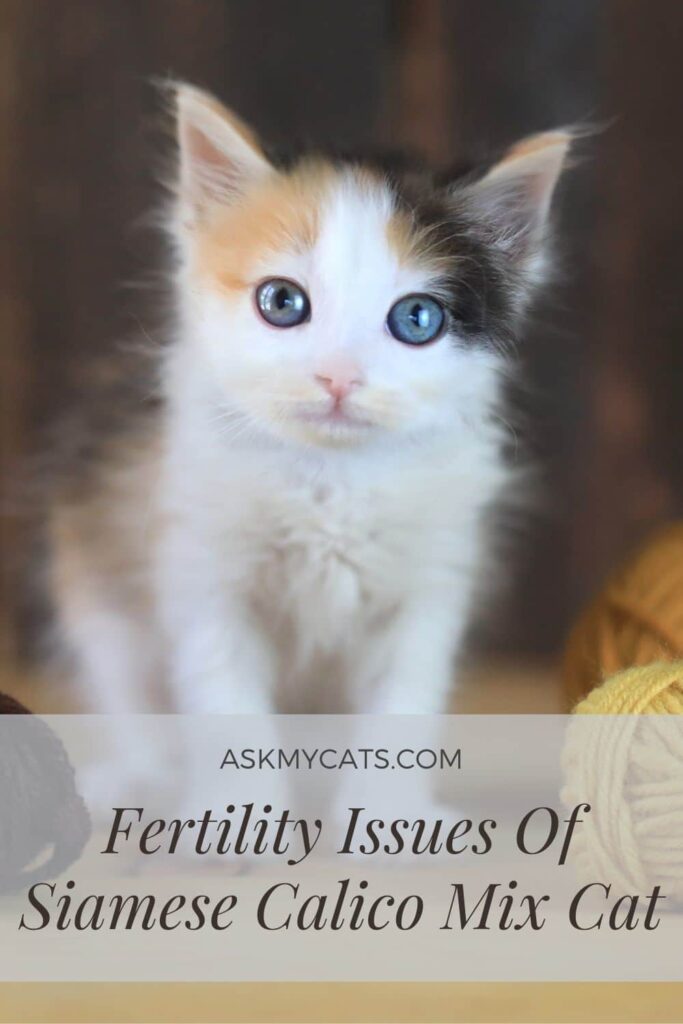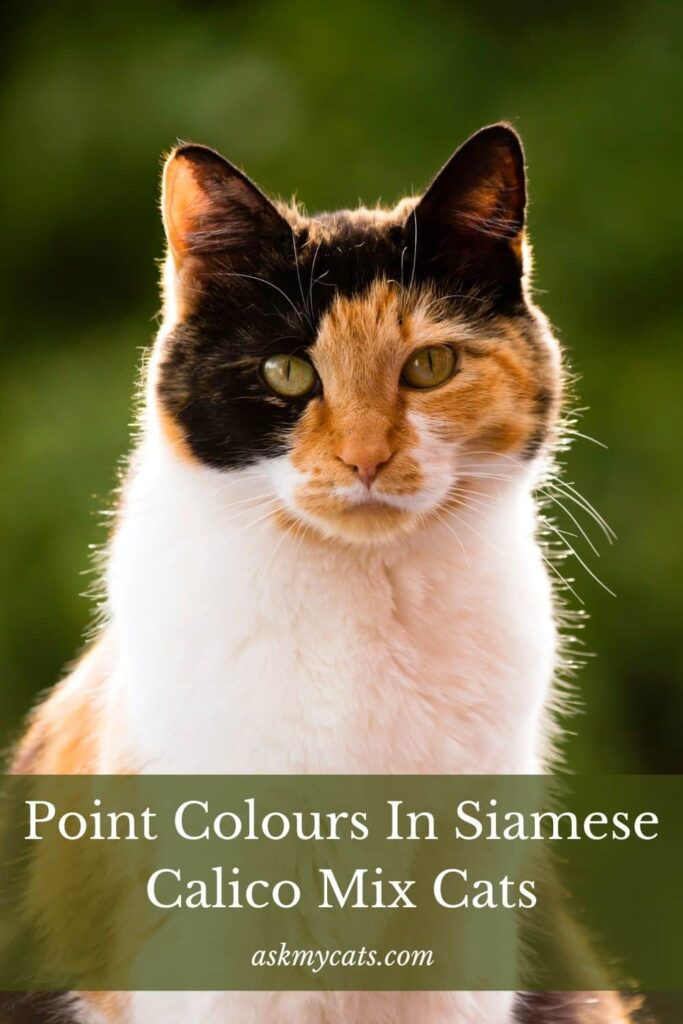Did you guys know, for instance, that Siamese kittens are one of the oldest known bred in captivity cats? Or that the colour of their coat is dictated by their evolution as well as the temperature of their environment? Yes, this is valid!
A calico kitten can be born to a male Siamese cat. The kitten, however, will be 50% calico, and only if she identifies as a colour. A Siamese cat, on the other hand, is unlikely to give birth to a calico kitten. Because the majority of male calico cats are sterile, this is the case.
Because there aren’t enough male calicos, a Siamese cat can’t have a calico kitten. But first, let’s get rid of the idea that “calico” is a breed.
Any domestic breed with a tri-colored coat qualifies as a calico cat. Typically, the coat is 75 percent white with large black and vibrant orange patches.


Give Your Cat the Perfect Day
Get the Free Ebook!
Siamese Calico Mix Cats: Fascinating Facts
1. Colour
The coats of Siamese cats come in a wide array of shades, and these colours aren’t purely determined by biology. Get your lab coat on and brace for a little biology.
Several sets of genes decide the colour of a cat’s hair, and modifier genes determine the pattern of their coats. Isn’t it Biology?
Siamese cats, on the other hand, have a special modifier gene that stops colour from forming in the fur, inducing albinism.
However, due to the miracles of medicine, the albinism modifier gene will only affect the cat’s fur over a certain temperature—specifically, between 100 and 102.5 degrees Fahrenheit.
When a Siamese cat’s body temperature decreases below 100 degrees Fahrenheit—or the cat is introduced to a cooler environment—her hair colour genes turn back on and pigment is carried to her fur.
Since a cat’s nose, head, feet, and tail are colder than the rest of her body, pigment is more often accumulated there on Siamese cats.
The majority of Siamese cats are born fully white and grow their markings over the span of a few weeks. What is the explanation for this? Since the womb is incredibly humid, the cat’s colour gene is unable to enter her hair.
Siamese kittens grow pigment around their ears, tails, and paws after being born and introduced to a cooler climate for a few weeks.
2. Ancestral Breed

The elegant, distinctive look of Siamese cats is probably their most well-known attribute.
While many Siamese cats have silver-grey coats and blue eyes, their coats may often be orange, brown, cream, or even blue or lilac-coloured, among other shades.
Yet Siamese cats are so much more than their mysteriously good looks!
Although no one knows exactly when Siamese cats were first bred and domesticated, they are thought to have originated in Thailand around the 14th century, when they were first mentioned in a Thai manuscript. As a result, they would be one of the world’s oldest cat breeds.
Don’t let your beloved kitty to jump off from the building! Read here.
3. Common Stuffs
Many Siamese cats have had crossed eyes and crooked, kinked tails for a long time.
Although certain genetic factors were undoubtedly responsible for these characteristics, many legends offered alternative explanations for Siamese cats’ unusual appearances.
According to a legend, a group of Siamese cats had to keep a golden royal cup. When the cats carried out their duties, they looked so intensely at the cupola that their eyes went through.
And because their tails were wrapped around the cake for additional safety, they bowed their tails constantly.
Although Siamese cats today still have crossed eyes and crooked tails, it is not almost so common. These features have been “unwanted” and have been selectively identified by cat fanciers.
We say that the cats only do their safety tasks!
4. Royalty
Hundreds of years ago, Siamese cats had their distinctive, unusual and beautiful appearances and were treasured by royal families in Thailand.
In fact, members of these royal families felt that if a Siamese cat was dying, it would receive its soul—and the cat would live in a temple and be mimicked by monks and priests the rest of its life.
Siamese cats were domesticated in Asia for centuries but did not appear in the USA until the end of the 1800s.
In fact, a Siamese cat was one of the earliest known proprietors of the US President Rutterford B. Hayes’s wife Lucy, meaning that Siamese cats also have a White House history.
Is your cat acting like something stuck in their mouth? This can be a serious problem.
5. Fertility Issues

It is probable, though rare, for a female Siamese cat to give birth to a calico-patterned kitten. That would be close to winning the lottery.
There will have to be two chips that fell in your favour:
Male calico cats figure for less than 1 in 1000. This is due to the fact that the X chromosome is responsible for both the colours orange and purple.
Orange is generally represented in males as a striped pattern. As a consequence, Tom is tabby! To have the calico coat, a male must have two X chromosomes and one Y chromosome. This is different.
Breeders don’t get too excited. And if one of these exceptionally rare births occurs, a calico-patterned Siamese would be extremely rare.
Your male calico is unable to become a parent because he has two of the female X chromosomes. This isn’t a feline-specific cause of infertility. Klinefelter syndrome is the name assigned to it as it happens in humans.
The male Siamese has no such difficulties with reproduction. This stallion has no trouble roping himself with a calico gal and producing partial Siamese offspring. And his descendants, especially his sons, will carry on his legacy. Note that male calicos are unusual.
This unfortunate man, on the other hand, is unlikely to be accepted to the Siamese country club. This is because calico halfies are not allowed into other pointed breeds. And the Siamese Sands are extremely rare.
Since he will only be half Siamese and half the mother’s breed, this kitten will be refused admission. She may be any of the 12 breeds that have the calico pattern on their coat.
Can cats pray for their owners? Know these reasons.
6. Personality
Despite not being a breed, the calico is said to have some personality characteristics. An individual with red hair, for example, may have a fiery personality.
Calico cats are intelligent, sweet, and have a warm personality. They adore spending time with you, your children, or your grandchildren.
Of course, the Siamese is a faithful, caring, and insightful creature. She even adores the youth – as much as they adore her! You have 100 percent of the fun and both cats are playful.
It’s no surprise that calico-Siamese crosses are so common. You have part of the Siamese’s genetic characteristics and the calico’s upbeat personality. You’ll end up with a pattern-loving, intelligent cat.
But aren’t calico cats known for their tenacity and tenacity? The Tortoiseshell springs to mind. The word “tortoiseshell” refers to a style rather than a breed. They’re also known as “dilute torties” or “torties.”
White is less likely to be the primary colour of a tortie. She is typically a bright orange and black mix. You should also apply patches of red, amber, ginger, and cinnamon to the mix.
That’s exactly how those torties look – as if God were to put in a few sprinkles for good measure! The patches may also imitate mottling or be inserted into a quilt pattern.
Torties, considering their negative status, may be faithful and caring cats.
Interesting Read: Can Siamese Cats Be Black?
7. Point Colours

Seal point, chocolate point, blue point, and lilac point are the four primary Siamese point colours. Four lesser-known point colours are as follows:
Red Point: It took a lot of time and work to make this kitten just right. Breeders began with a Siamese and then found a red tabby-tortoiseshell hybrid.
She’s got red-gold points all over the place. Her body is a fluffy white, with pink paw pads and a pretty pink nose.
Cinnamon Point is the best subject cat for autumn. On an ivory body, these guys have cinnamon and brown points.
The cinnamon colour above their eyes and on their paw pads separates them.
A Siamese, a red domestic short-hair, and an Abyssinian go out for a date. The cream point Siamese returns three months back.
Her coat would be a light cream colour with colder cream points. She is one of the breed’s most fragile representatives.
Apricot Point is another cat that loves the fall season. He’s a fluffy white with a touch of hot cream paint. These points have a distinct taste about them. On his arms and tail, they look speckled or striped.
Frequently Asked Questions
Can Siamese cats be calico?
A male Siamese cat can have a calico kitten. But the kitten will be 50 percent calico, and then only if she identifies as a colour. But it is very unlikely that a Siamese cat can give birth to a calico kitten. This is because the majority of male calico cats are sterile.
What is the rarest Siamese cat?
Since a flame point, Siamese is the rarest coat for this breed; these will be the most expensive Siamese cats you can buy.
What is a calico tabby mix called?
A Striped calico is referred to as a calibby. This is a mix between a tabby and a calico. So instead of having just irregular splotches of colour, the calico will have a striped or spotted coat. The addition of stripes and or spots gives the calico an extra dimension.
What are calico cats mixed with?
Calicos are between 25-75% white with a mix of orange and black. These colors may be lighter or darker on some cats than others, but all three — white, black, and orange — must be present for the cat to be considered a Calico.
Do Siamese cats like to cuddle?
Although they’ll give you space, Siamese cats love to cuddle. It’s easy to invite them to snuggle, too. … They are a quite physical breed of cat and want the same kind of affection back. As much as they are playful, Siameses are an incredibly cuddly breed of cat.
Why do Siamese cats bite so much?
Overall, cats will bite, no matter the breed. The breed of Siamese primarily is known for this due to their high levels of energy, playfulness, need for attention, and so on. Although they are certainly more prone to being active biters than other cats, it doesn’t mean that the problem cannot be fixed.
Final Words
How they will behave as a kitten, will completely depend on their personalities. Nobody would be able to judge them beforehand.
So, do you possess a siamese calico mix kitten? Have you noticed any unusual behaviours in them? How is it like to be a mother of them?
Drop your valuable stories in the comments section below!

I grew up with a 1/2 Siamese cat who was calico. My cat’s mother was purebred Siamese and they couldn’t keep her indoors and unpregnant long enough to ever get her neutered. There goes your theory on female Siamese birthing calico cats!
That must have been one of a kind experience!
Right lol my sisters female Siamese gave birth to my female calico so my girl is half Siamese through her mother and phoebe is now 9 years old
My crazy Lumi appears to be a Siamese/Cali mix. She’s the most unusual cat I’ve ever had.
That’s a great thing to hear.
I am am a cat person for 50 + years and owning calico cats is, has been like my luck charm and grounding for me and they had lived long lives. I’ve owned many & multiple cats most my life. And I thought I’ve seen, had it all. I also had 2 half siamese & DSH cats years b4. And had an extremely unique cat, Snuggles & I so enjoyed him and his crazy antics. ( I can explain about him later or on request). Approx. 2.5 yrs ago I found 2 Calico kittens with a Siamese mom & orange DHS dad cat. I can say I’m so glad to find your article!! As I was researching the type of coats / fur of Siamese. I have never had such crazy, smart, playful, mischievous cats in my life! I call them The crazy Calicos!! Feel free to contact me. As it would be a long long post. Of all their Antics.
Terri
You are so lucky Terri…
Happy cat parenting. 🙂
We took in a pregnant stray in 2018, she was all white but had 2 patches of color one on the head the other on her back. When the 4 babies were born the first one out was female dilute calico. The next 1 all white later she turned lilac pointed, the last 2 came out of the same sack both were pure white(later flame point and they are both big boys and still identical.
It is not uncommon for a pregnant cat to give birth to a litter of kittens that have a variety of colors and patterns. This can happen because cats have multiple genes that control their coat color and pattern, and these genes can be inherited in different combinations from the mother and father. In the case of your cat and her litter, it is likely that she and the father of the kittens had different combinations of genes that led to the variety of colors and patterns in the kittens.
Dilute calico is a term used to describe a cat that has a coat that is a diluted version of the typical calico pattern. This means that the cat has patches of white, black, and orange, but the colors are less intense than they would be in a typical calico cat. The lilac pointed pattern, on the other hand, is a variation of the Siamese pattern, in which the cat has a white or cream-colored body with darker points on the face, ears, paws, and tail.
Flame point is another term used to describe a Siamese-patterned cat, but in this case, the points are red or orange instead of the traditional dark colors. It is possible that your cat’s two all-white kittens inherited the flame point pattern from their mother or father, which is why they later developed red or orange points on their face, ears, paws, and tail.
Overall, it is not unusual for a litter of kittens to have a variety of colors and patterns, and this is just one of the many fascinating aspects of feline genetics.
Welp; we got our calico kitten from a siamese female who had a litter of them sooo… 🙃
Many Many congratulations.
Happy cat parenting
Our calico female had kittens with a ? Daddy. Two of the kittens are white with grey ear tips and tails with the one having a severe kink on the end of his tail. Could they possibly be half Siamese?
Also the one has balance issues and coordination which looks like cerebellar hypoplasia.
Hi there! It sounds like you have an adorable litter of kittens! As for their possible Siamese heritage, it’s certainly a possibility. Calico cats can carry the gene for the pointed coat pattern found in Siamese cats. The white fur with grey ear tips and tails could be an indicator of this. However, without a definitive parentage test, it’s challenging to say for sure.
Regarding the kitten with the severe kink on the end of its tail and balance issues, it’s possible that it may have cerebellar hypoplasia. Cerebellar hypoplasia is a condition where the cerebellum, the part of the brain responsible for motor coordination, is underdeveloped. It can result in balance and coordination issues.
If you’re concerned about the kitten’s health, I would recommend consulting a veterinarian. They will be able to provide a proper diagnosis and offer guidance on how to best care for the kitten. Wishing you and your kittens all the best!